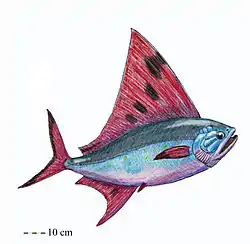Plethodidae
Plethodidae is an extinct family of teleost fish that existed during the Late Cretaceous period. Fossils are known from North America, North Africa, and Europe.
| Plethodidae Temporal range: Late Cretaceous | |
|---|---|
 | |
| Bananogmius ellisensis | |
| Scientific classification | |
| Kingdom: | |
| Phylum: | |
| Class: | |
| Infraclass: | |
| Order: | †Tselfatiformes |
| Family: | †Plethodidae Loomis, 1900 |
| Genera | |
|
Refer to § Genera | |
| Synonyms | |
| |
Description
Plethodids possessed thin, angelfish-like bodies and often had high dorsal fins which made them distinctive from other types of fish. Their skeletons were partially cartilaginous, though the amount varied from one species to another.[2]
Genera
As of 2005, there are seventeen recognized genera in the family Plethodidae:[3]
- Bachea
- Bananogmius
- Dixonanogmius
- Enischorhynchus
- Luxilites
- Martinichthys
- Moorevillia
- Niobrara
- Paranogmius
- Pentanogmius
- Plethodus
- Pseudonogmius
- Pseudothryptodus
- Syntegmodus
- Thryptodus
- Tselfatia
- Zanclites
References
- GBIF. “Plethodidae – Checklist View.” Global Biodiversity Information Facility. Global Biodiversity Information Facility, 2014.
- Everhart, Mike (23 Aug 2011). "Plethodids". Oceans of Kansas. Retrieved 28 April 2014.
- Gayet, Mireille; Louis Taverne (2005). "Phylogenetical relationships and paleozoogeography of the marine Cretaceous Tselfatiiformes (Teleostei, Clupeocephala)". Cybium. 29 (1): 65–87. Archived from the original on 2014-04-29.
This article is issued from Wikipedia. The text is licensed under Creative Commons - Attribution - Sharealike. Additional terms may apply for the media files.